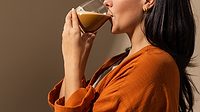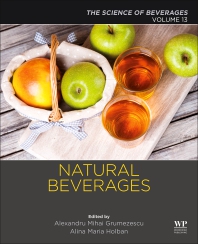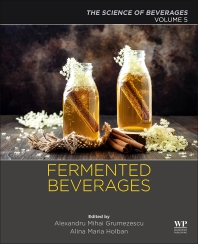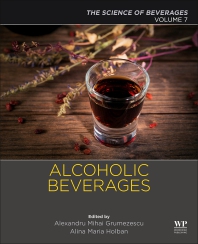R&D Feature
Consumers value beverages that support immune health
Immune health remains priority post-pandemic

Image courtesy of Getty Images
The TV series “The Vampire Diaries,” which ran on The CW from 2009 to 2017, follows the lives of teenagers living in the small Virginia town of Mystic Falls. An array of supernatural beings — including witches, warlocks, werewolves, sirens and, of course, vampires — always find their way into town, then proceed to wreak havoc on the lives of its citizens. The vampires in the show are immune to aging, natural death, disease and most illnesses.
In the beverage arena, consumers aren’t on the hunt for blood like the vampires to keep their bodies functioning ― instead, they are searching for beverages that go beyond hydration.
Jenna Nelson, marketing director for EpiCor at Cargill, Wayzata, Minn., says that the idea of “food as medicine” has become a way of life.
“Not so long ago, consumers might have solely turned to supplements for immune support, but today’s consumers also expect their food and beverage choices to contribute to well-being,” she explains. “As a result, the immune health category continues to grow, fueled by more product innovation and greater accessibility than ever before.”
Nelson notes that, in the past, immune support was a seasonal challenge. Now, consumers see it as a necessity all year long, she says.
Niamh Hunt, global marketing manager of immune and joint health at Beloit, Wis.-based Kerry, echoes similar sentiments, noting that refreshment isn’t “enough” for modern consumers — they want beverages that are functional and will help them achieve their health goals.
According to Kerry’s global consumer research, 69% of consumers worldwide “have purchased, or would consider purchasing, a fortified or functional beverage,” Hunt says. This shift reflects the growing concern consumers have when it comes to their well-being and nutrition, and consumers growing awareness of how interrelated body systems and everyday stressors influence their health, she explains.
Hunt adds that more consumers are recognizing the link between immune health and overall health, and that there is an increased interest in product benefits that have been proven with scientific evidence.
“Immune health support is also a growing trend in the sports nutrition category, while on-the-go, functional drink options that appeal to children are becoming very popular among parents who want to support their growing families’ health,” she says.

Image courtesy of NextFood Inc.
Maria Stanieich, marketing manager at the New York-based Kyowa Hakko, suggests that, despite functional beverages having a higher price point than traditional dietary supplement formats, beverages have an added convenience benefit that attracts consumers.
“Our lives are on-the-go like never before, so if we can package up immune health ingredients into convenient beverages that taste great, we can meet multiple lifestyle demands,” she says. “Functional beverages are pulling immune health ingredients into new usage situations — for instance, Well Traveled is a recent launch that contains our IMMUSE postbiotic for immune health. This is a beverage powder that travelers can toss into their luggage to support healthier days while they’re traveling.”
In a post-pandemic world, Stanieich notes that consumers have placed a new emphasis on their immune health. A recent survey by Kyowa Hakko found that among those who take immunity supplements, 79% take such supplements as part of a daily regimen for long-term immune support, she says.
James Street, marketing director EMEA and APAC at Prinova, Carol Stream, Ill., echoes similar sentiments regarding the value consumers have placed on immune health since the pandemic.
“There is growing awareness of the role nutrition plays in immunity, and demand for beverages with immune-health benefits has never been higher,” he says. “One effect of this is a blurring of distinctions between categories.
“For example, many consumers of sports nutrition products are now seeking immune support alongside benefits for energy and muscle growth,” he continues. “This is particularly notable in mainstream consumers who exercise less frequently — they are twice as likely to prioritize immune health than those who exercise daily.”
Catering to consumer interest in immunity
Beverage-makers have had to respond to the consumer interest in immune health.
Kerry’s Hunt notes that beverage manufacturers are looking to add immune health support as a benefit in their products more frequently. They do so by “leveraging the opportunities made possible by innovation in functional ingredients” that are supported by research, she explains.
“Claimed benefits once only found in supplements are now becoming widely available in all types of beverage formats,” Hunt says. “By choosing ingredients that are soluble, with minimized off-notes, neutral flavor and cost-effective doses, brands can give themselves the edge in a highly competitive market.”
Cargill’s Nelson points to brands offering products with more than just one health benefit.
“We expect demand for functional beverages to continue to increase, as consumers prioritize health and look for holistic solutions to improve well-being,” she says. “As consumers learn more about the role immunity, gut health and the microbiome play in achieving their wellness goals, demand for products that deliver these benefits will continue to grow.”
Kyowa Hakko’s Stanieich suggests that immune health-focused beverages are “a major opportunity.”
“Although dietary supplements in capsules and gummies remain popular formats for supporting immune health, the (Kyowa Hakko) survey data point to growth opportunities in immune-boosting beverage applications,” she says. “Many supplement consumers reported purchases of bottled juices, teas and smoothies both as proactive immunity support and in response to getting sick. These formats are easily combined with immunity-supporting ingredients and immunity-forward flavors, like elderberry and citrus, to amplify the appeal to immune health support.”
Vaughn DuBow, global director of marketing, microbiome solutions at ADM, Chicago, also notes that consumers are increasingly looking for ways to support their health and well-being, especially in manners that are long-term.
“Immune function is often associated with longevity by consumers, and the focus on health and wellness support today for a better future is motivating consumers to seek out ingredients and products they associate with immune function support,” he says. “ … This is driving product developers to incorporate ingredients that provide immune function-supporting benefits in various product applications, including functional beverages.”
Finding the right formula
Commonly used ingredients in immune health beverages include standards like vitamin C and vitamin D. Cargill’s Nelson says that these two vitamins have continued to be a mainstay of immune health-associated beverage formulations.
“But alongside these traditional offerings, there’s growing interest in newer health-supportive ingredients, including emerging options like postbiotics,” she notes. “While every postbiotic is unique, Cargill’s EpiCor postbiotic builds on our 75 years of fermentation expertise and is backed by multiple published studies conducted in the dietary supplement space.”
Nelson points out that “not every health-support ingredient” is a fit for the beverage space.
“Take probiotics — these are living organisms, and factors like heat and pH can have a negative effect on their viability,” she explains. “That’s one of the benefits of EpiCor postbiotic. Because of its inanimate nature, EpiCor is easy to use in beverages, offering heat, pH and shelf stability.”

Image courtesy of Ocean Spray
In an era where consumers are becoming more and more well-informed and inclined to research their products, Hunt notes that it’s “never been more important” for brands to choose ingredients that are clinically validated.
“This is where Kerry’s ProActive Health portfolio of branded ingredients can make a real difference, with every ingredient well-researched and backed by numerous credible clinical studies supporting their claimed benefits,” she says. “Branded ingredients also help to educate consumers in the area of immune health and communicate the science behind the ingredients in a meaningful and impactful way.”
Hunt notes that the company’s yeast beta glucan, Wellmune, is clinically studied to support both immune health and overall wellness. Wellmune is suited for beverages that appeal to an array of age ranges, from toddlers to seniors, she says.
Meanwhile, Kyowa Hakko’s Stanieich points to the company’s IMMUSE postbiotic, which works through a process to activate plasmacytoid dendritic cells (pDC). “[A] pivotal leader within the immune system,” IMMUSE is clinically researched and can be used in dietary supplements and functional beverages, she says.
Randy Kreienbrink, vice president of sales at Fort Wayne, Ind.-based Artemis International, notes that a number of health-associated ingredients often are used in beverage formulations. Yet, formulations that include elderberry juice extract, vitamin C, zinc gluconate, echinacea, ginger and lemon are among the most popular.
“Artemis International has proprietary branded ingredients that are ideally suited to beverage applications,” he says. “Berry Defense, for example, is a multi-functional blend of elderberry, aroniaberry and black currant extracts and juice powders.
“ElderCraft has been scientifically substantiated with large-scale human clinical trials in addition to numerous other studies demonstrating its potent immune support properties and other clinically relevant benefits, like prebiotic activity in the gut,” he continues.
Noting that vitamins C and D are the most commonly used ingredients in immune health beverage formulations, Prinova’s Street points to the company’s portfolio of premium-quality ingredients for immune support.
“These include vitamin C, of which we are the biggest global distributor, and vitamin D, which plays a vital role in maintaining the proper functioning of the immune system,” he says.
Moreover, Prinova’s portfolio is diverse, and incudes minerals, antioxidants, probiotics and botanical extracts, Street notes.
“Alongside single ingredients, our nutrient premixes and customized solutions contain ingredients for function and flavor that are compatible with on-trend, functional beverage formulations for immune health, including RTDs (ready-to-drink),” he explains.
Like many of the other experts, ADM’s DuBow points to vitamins as what consumers most often associate with immune function support. Additionally, he says “tailored convenience is key” for the modern consumer, and that can be achieved in functional beverages with a multitude of benefits.
DuBow also notes that many consumers agree with the notion that “a poor digestive system can have a direct impact on the immune system and vice versa.” Therefore, gut microbiome-supporting solutions are “prominently showcasing” in a variety of beverage offerings formulated specifically for immune function support, he says.
When considering beverage formulations to support immune health, Artemis International’s Kreienbrink notes that beverage-makers have a lot to think about.
“Key considerations include stability, flavor, color and taste,” he says. “Also, U.S. FDA regulatory matters and terms must be kept top of mind … Artemis International science, R&D and QA teams are committed to thorough testing and vetting of our ingredients for manufacturer applications in the beverage industry.”
Determining what’s next for immune health beverages
Although it’s hard to predict what exactly is on the horizon for immune health ingredients, Cargill’s Nelson suggests that brands should continue to offer consumers functional beverages with ingredients that are science-backed.
“There’s new research publishing every day and new players and products entering the space; it can sometimes seem like the wild frontier,” she says. “ … That’s why we’re focused in this space. With more than 75 years of fermentation expertise, Cargill is a leader in developing specialized postbiotic ingredients that support human health — something we see as the next evolution in immune health.”
Kerry’s Hunt says there is opportunity in the area of products geared toward stress and immunity, as consumers become more aware of links between the two.
“Science-backed ingredients, which are clinically demonstrated to support the immune system during times of stress, can be incorporated into innovative, functional beverage solutions to provide a compelling offer that addresses this key concern,” she notes. “Applications associated with relaxation, such as teas and coffees, are ideal for this space.”
Artemis International’s Kreienbrink suspects that consumers will rely on food and beverages to help maintain health over supplements.
“I predict expanded growth for real, efficacious, shelf-life protected products, both RTD and powdered drink mixes for convenience and travel,” he says.
Regardless of what is next for immune-focused beverage, it is clear that consumers will continue to prioritize their health and wellness.
Looking for a reprint of this article?
From high-res PDFs to custom plaques, order your copy today!









